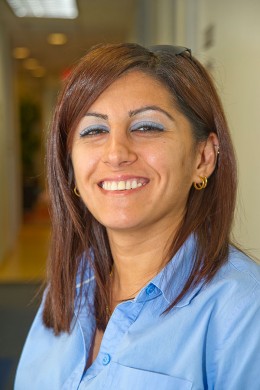Immigrant stories: For the love of two countries
By Jennifer BrooklandSeptember 24, 2013

For someone who grew up admiring the gold-brushed waters of Egyptian beaches and the magnificent ruins of Petra and Jerash, Ramia Badri’s first glimpse of America must have been a little underwhelming.
Blame it on the art supplies.
When Ramia got off the plane at O’Hare International Airport in Chicago, transportation authorities seized her suitcase full of paints and pots, oils and chalks that had set the scanner screaming. “You sit here. We’ll get back to you,” an officer told her.
Four silent hours later, after wondering if she would be allowed into the country at all, Ramia had missed her connection, and was alone at night in a new country.
But Ramia lets few things faze her. She got into a cab and told the driver to take her to her final destination of Muncie, Indiana. “You know you’re crazy, right?” the driver asked. She didn’t know it was a four hour drive from Chicago.
Past the dark highways and cornfields of the Midwest, Ramia finally arrived to start the next chapter of her life in a dorm room of Ball State University. She planned on completing a master’s degree and taking a break from the horrible violence of wartime Iraq. It was not until years later Ramia realized she had made America her home.
Creative Associates International is reflecting on the contributions of immigrants to our professional and social lives, and paying homage to the large number of “Americans by Choice at Creative” who work every day to help people in the countries they came from, and countries around the world.
 Unlike most immigrants, Ramia had already fought for this country before she stepped foot in the airport.
Unlike most immigrants, Ramia had already fought for this country before she stepped foot in the airport.
After graduating from college with an art degree, she had worked as an illustrator for a children’s magazine and as a gallery assistant—hanging, framing and cleaning artists’ work.
But on an impulse, she switched gears and took a job as a translator with the Coalition Provisional Authority that stood in for an Iraqi government in 2003. When a recruiter from a U.S. Army Airborne unit convinced Ramia to become an interpreter for troops serving in Operation Iraqi Freedom, she decided to attend the Royal Jordanian military Academy for military police school and army basic training. She was one of just 11 “Iraqis” who were at the Academy preparing to serve in the new Iraqi Army.
Ramia’s duties in Jordan felt a bit like prison, she teases: She did dishes and laundry and reviewed the lines of soldiers, inspecting the tucks of their shirts and the level of shine on their boots. She had a brief post working in the barbershop, where she found her art degree did not really translate.
“I destroyed a lot of heads,” she says. “I ended up shaving a couple of them bald—it was the only way to fix what I’d done.”
But once she finally made it to her post in Iraq and began working alongside American soldiers, she got a new perspective of the war. When she saw the military distribute school supplies to impoverished children, help with trash removal and find jobs for young graduates with nothing to do, she realized she could help people every day, and contribute something to humanity.
“Traveling to the poor areas and seeing the impact that these projects are making…kind of blew my mind,” she remembers. “That’s what drew me to it. It’s the humanitarian side of it. There are so many people in need and I didn’t know about that.”
Ramia fell in love with the idea of working in development. But her transition was not a smooth one. It started with a car bomb that exploded while she was at work in a guard tower.
Recovering from blast injuries, in need of physical therapy and in a country where the violence was inescapable, Ramia felt she was running for her life. She decided it was the perfect time to take it easy and go to grad school. She let her mother’s network of college friends from Ball State talk her into registering.
“I was thinking about going to school but not a big move across the world and all that,” says Ramia. Nevertheless, when she finally arrived with her single suitcase after the midnight cab ride, she loved Ball State, and the calm stability of Muncie, Indiana.
Education has always been treasured and expected for generations of Ramia’s family. Almost all of the men on Ramia’s father’s side served in the Ottoman military in Turkey. As for her mother’s family, they were archeologists, fascinated with the ruins of ancient civilizations and involved in many of the important digs along the Euphrates. Her parents went to art school but were also educators.
Invalid Displayed Gallery
It makes sense, then, that Creative’s focus on building stronger communities through education was something that attracted Ramia to the company.
Securing children’s access to quality education, especially in conflict countries like the ones she had lived in, would do more for them than handing out school supplies or clearing trash that was bound to pile up again the next week.
Her choice not to return to Iraq was a conflicted one, despite the fact that her friends and family had left the country, and those who had stayed did not survive. She misses the people she knew there the most.
But at Creative, where there are so many immigrants, her coworkers help fill the gap.
“There are a lot of experiences we share, even though we come from different countries, different cultures and different backgrounds,” she says. “We’re trying to adjust to this so we may as well do it together instead of feeling lonely and…isolated.”
It’s one of the things she likes the most about working here.
Not that she disregards Americans. As a legal permanent resident, she is on track to earn her U.S. citizenship next year. And to Ramia, the U.S. citizens who work at Creative are sharing in her own experience of becoming American. They remind her of who she is.
“We love this place. I mean obviously I fought for this country in our war,” she says. “Nobody could love it more than I did.”
